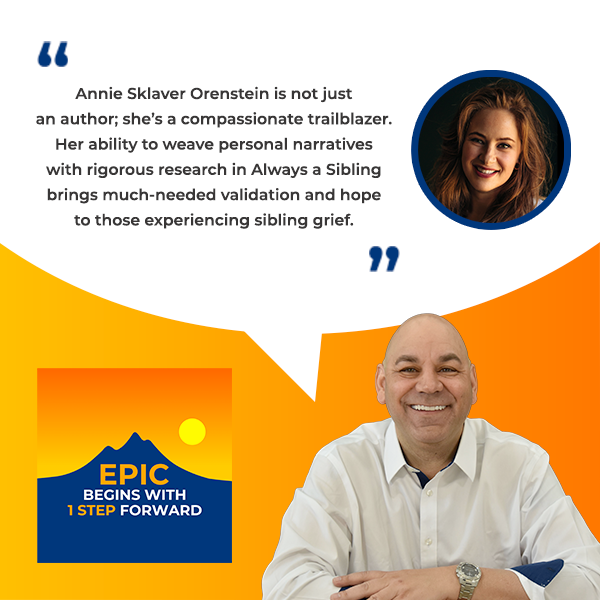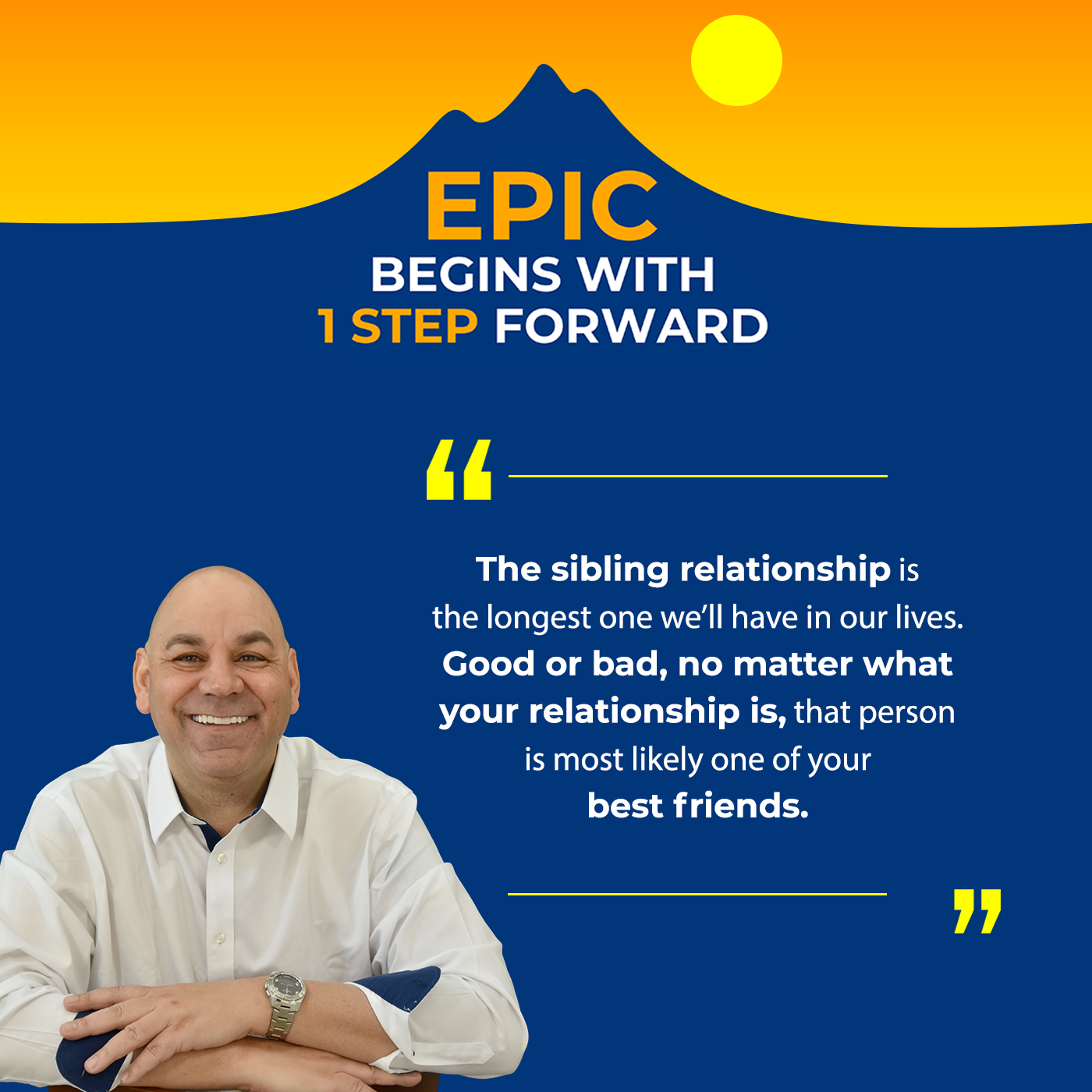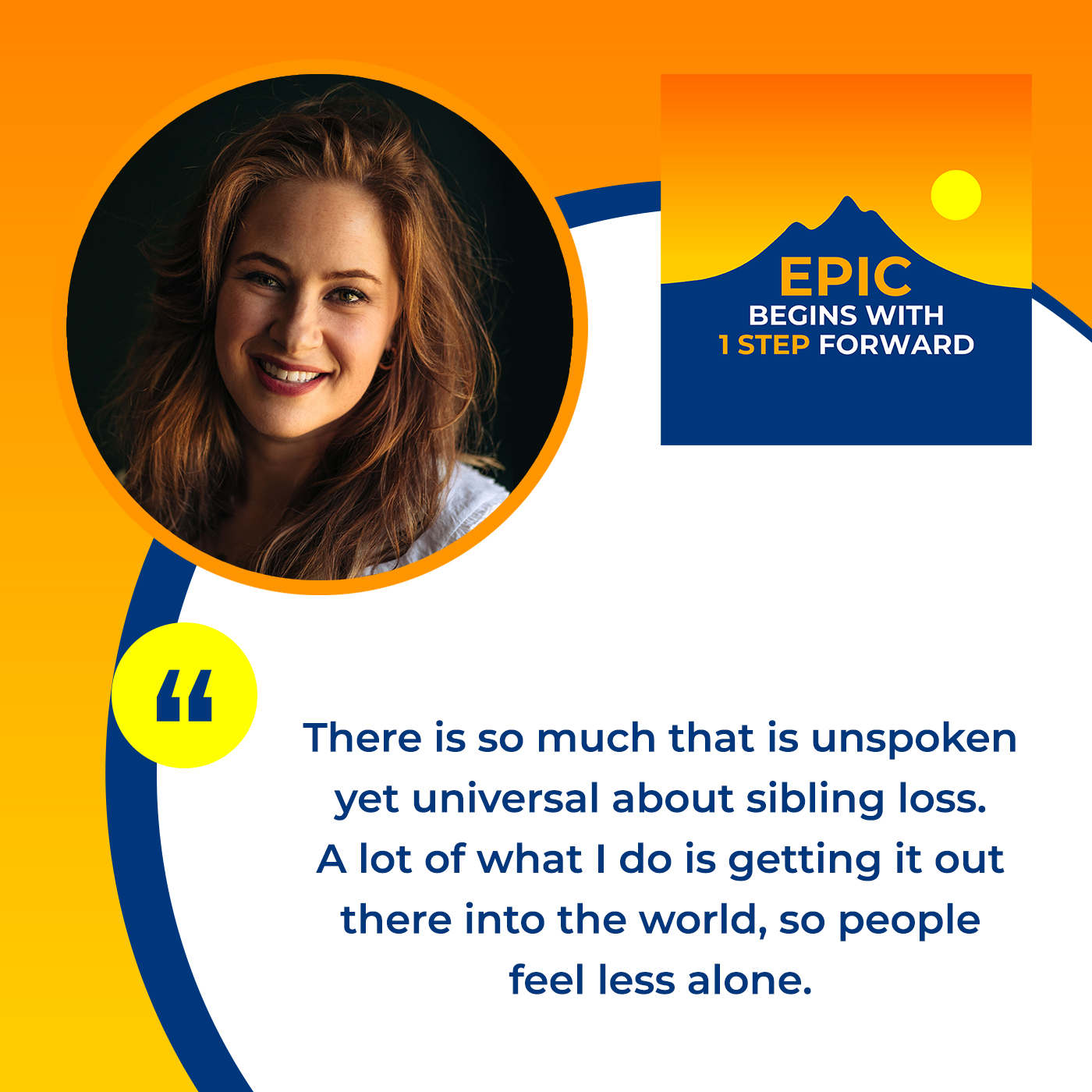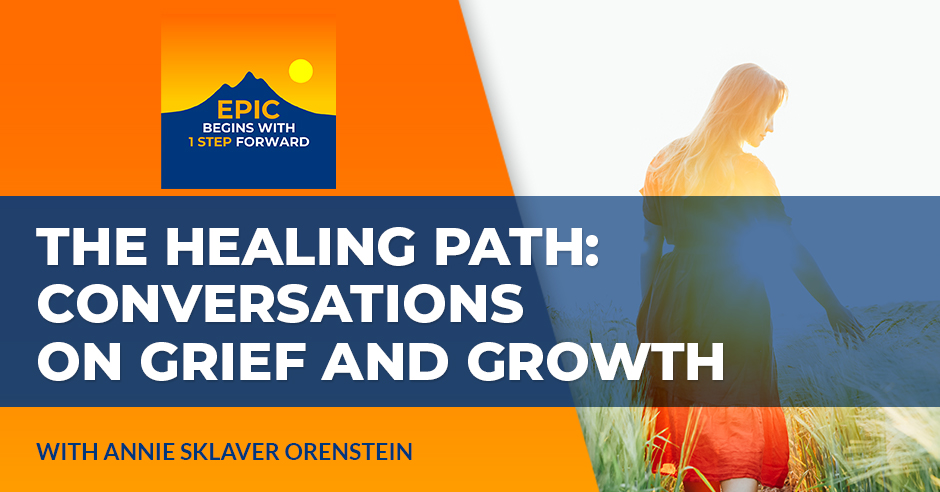—
Watch the episode here
Listen to the podcast here
The Healing Path: Conversations On Grief And Growth With Annie Sklaver Orenstein
Welcome back to another exciting episode of Epic Begins with One Step Forward. I’m your host, Zander Sprague, and it’s a special day because I am talking to Annie Sklaver Orenstein. Annie, tell us who you are and what you do.
First of all, thank you so much for having me. I’m very excited to be here. I’m Annie Sklaver Orenstein. I am a researcher. I work in tech as a research lead, but I also am an author, and I wrote a book called Always a Sibling: The Forgotten Mourner’s Guide to Grief, which came out back in May. It’s a book on grieving the loss of a sibling, and I wrote it about fifteen years after I lost my oldest brother, Ben, who was killed in Afghanistan. At the time when he was killed, I had a very hard time finding any resources that really resonated with me. The book is very much the resource that I needed at the time, and it’s research-informed and backed with both academic research and also my own primary research. It’s out, and it’s been a pretty incredible experience.
Shared Experiences Of Sibling Survivors
I too am a sibling survivor. I lost my sister coming up on 28 years ago. I too wrote, I’ve actually written two books. One was for siblings, much like you. I too found a complete lack of resources for siblings, so I wrote about my experience. I got five of my friends who had lost siblings to answer these questions. I think this is really cool. We have a lot to talk about. First and foremost, I’m sure your experience has been that being a sibling survivor is at times a lonely experience. People ask how your parents are, but no one asked how you were.
Exactly. It’s the forgotten mourners.
I talk about the forgotten mourners all the time. I’m interested to know, because I talk about sibling loss a lot, I sit on the board of the Compassionate Friends, which is an organization for families that have lost a child, a sibling, or a grandchild. I’m the sibling repso. I do a lot of work for and with siblings. You said that you had some research-backed information in your book, and I am fascinated to know what some of that research is.

As a researcher by training, I felt that was the way that I knew to approach the situation. Otherwise, I could only speak to my own unique experience. As someone who got along very well with her siblings, and we didn’t experience a traumatic childhood, my brother being killed in Afghanistan, the support and response we received from our community was very different than folks I know who have lost siblings to addiction or mental health issues.
I knew that there was no way I could really speak to the full sibling loss experience and all of those various factors because I was coming from a very narrow place. The book, a lot of what’s in there comes from academic research on grief and familial bereavement. There are some studies on sibling loss, certainly not enough studies on sibling loss. They all end in more research is needed on sibling loss, so that’s a delight to find.
Really, extensively, on the research that does exist on sibling loss, also a lot of research on the sibling relationship and just the general impact of the sibling relationship. On top of that, I surveyed a little over 350 bereaved siblings. From there, I did follow-up, in-depth interviews with about 40 folks who really, in terms of recruitment, covered a lot of the bases, especially areas that I couldn’t speak to firsthand. Interviews with folks who have lost older siblings and younger siblings, had good relationships, fraught relationships, different causes of death, really capturing a lot of those experiences. That’s much of what’s reflected in the book.
Understanding The Unique Sibling Loss Experience
That is awesome. Thank you so much for doing it because you are right, there is so much need. When I was in graduate school, one of my big focuses was on sibling loss. There were times where I wanted to write papers. Even to this day, I’m challenged. As I’m talking, I’m trying, I was finding research to back up what I know to be true. I was asked to come talk to a local healthcare group, their psychologists and their counseling staff. I needed to have four academic papers to back up what I was saying. I was really hard-pressed.
Going in, when they told me that, I’m like, “That’s fine, I can find studies.” If it has to be within the last ten years, I’m going to be hard-pressed to have four of them because they just aren’t there. “Can I just bring in whatever I can find?” I spent a lot of time trying to advocate for siblings because, as my friend Heidi Horsley says, “When you lose a sibling, you lose your past, your present, but also your future.” There are all those things that, unfortunately, your brother, you expected he would see. Be it promotions and major life events.
When you lose a sibling, you lose your past, your present, and your future.
I spoke with some family dynamic and sibling experts for the book. I would ask them, “Why isn’t there this research?” They have logical explanations, but not necessarily good ones. Logical explanations that basically point to why this is a very difficult subject matter to study because there are so many factors involved, and you can’t control for them. A lot of times, that becomes a very scary study to do and a hard study to back.
I don’t think it’s a reason not to do it, but it was interesting to me that so many of these studies really consistently found that the loss of a sibling led to significant psychological, even physical issues later in life, and these very long-term effects from losing a sibling. Yet, they all end with, “Sibling loss is extremely significant, and it’s the most under-researched form of familial loss. More research is needed.” There’s no more research.
Raising Awareness For Sibling Survivors
In my experience, and I say this when I’m talking, I’m like, my background tells me, and my experience tells me, from myself and from talking with other survivors, that the unacknowledged grief has a profound effect on people. However, just like the research backs up, it’s really hard to point to causality, which of course science wants. We’re seeing that, and I’ll just use an example of self-medication. These people seem to start to self-medicate after they lost their sibling. However, there was a family history of substance use, so you can’t point, even though you and I might look at it and go, “I’m pretty sure.”
I think that the fact that sibling loss, people don’t know about it, and I don’t know how they don’t know about it. I obviously, like you, did some research, did some math and statistics. There are over 1.3 million new sibling survivors in the U.S. every year. That’s across the whole entire age range. I can’t break it down and go, “Of that, 60% are people over 70 years old or something,” but it’s still significant, and it’s still everywhere. I’m sure you and I, walking through the supermarket, there are sibling survivors that we’re passing. We’re everywhere, and yet we’re all alone. We all walk around, and we don’t have some special hand signal that we can say, “I’m a sibling survivor.”
It’s been really interesting, even just since working on the book. We queried, went out on submission to a bunch of publishers, and unbeknownst to us, there were multiple editors who got back to us and said, “I am the audience for this book. I lost a sibling.” We didn’t know that when we were querying them. There’s no real way to know. Similarly, when the book was then announced, my editor at Hachette got a bunch of messages from folks internally who said, “Can I have an advanced copy of this book? I’m the audience.” My editor was like, “These are people I’ve worked with for a long time, and I had no idea that they had lost a sibling.”
Even just conversations I’ve had with other parents at my kids’ school events, they’ll ask what I do. Honestly, depending on my mood, sometimes I lean into tech, and sometimes I lean into the book, and whether or not I want to talk about it. It’s been the same kind of thing where people tell me that they’ve lost a sibling. If I hadn’t initiated and said it first, I wouldn’t have known.
I’ll ask people what they do, they’ll ask what I do. Although I shouldn’t be surprised after all of these years of talking about it. Honestly, every time, I was on a call with a company that was pitching me to sell me something. I’m like, That’s great. I just mentioned about the loss. The man on the call is like, “I lost my brother three years ago. I honestly haven’t really talked about it. I’ve had people who, when I mention it, say, I lost my brother 15, 20 years ago. My family never talks about it, and I’ve never got to talk about it.” Again, it is amazing. Although, from understanding the numbers, it’s going over a million people in the U.S.
Statistically, it makes sense.
Statistically, we’re everywhere, and yet we’re nowhere. We’re the forgotten mourners. Yet when you bring it up, people go, “That’s totally logical.” It’s not hard to conceptually get, and yet no one has thought about it. Part of my mission is to raise that awareness where the question is not only, “How are your parents?” but also, “How are you doing?” or “How are the siblings doing?”
The sibling relationship, it’s the longest one we’ll have in our life. For good or for bad weather, no matter what your relationship is, that person is most likely one of your best friends. They know you better than you know yourself, and you know them better than they know themselves. That sibling relationship is, here, I’ll ask you this question. If you happen to get into an argument with your brother, did you start off nicely and say things that were mildly hurtful, or were you swinging for the fences, saying the thing that you knew was going to hurt him?

Probably the latter.
We’re all swinging. We got the dirt on each other, and when we get upset, hurt, whatever, we’re not saying, “Annie, you got a really bad haircut last week.” They’re coming back with the thing that’s going to hurt you, that you’re sensitive about. That’s part of that sibling relationship.
You know what’s so funny? I have two brothers. I have one who’s still alive, and my dad sent this email to us last week with something my brother had written years ago that my dad was like, “Look what I found.” I really wanted to rip on my brother and make fun of him, but also, I didn’t want my parents to see because I wanted to make fun of him for something that I still didn’t know if they knew about. Meanwhile, we’re in our 40s, and so I’m messaging him on the side in a separate thread so that I can rag on him without revealing any of his secrets to my parents.
I bet your parents do now.
Of course they do, but it never ends. Even in our 40s, it’s the same kind of thing.
My younger sister, if for whatever reason we get into it, we are absolutely going for it, you’re swinging for the fences, because you’re like, “I’m winning this,” or if I’m not, I’m going down swinging hard. I think that’s part of that sibling relationship, and then when it’s gone, it’s hard. I tell stories of my sister to keep her alive in my life, but I don’t canonize her. You want to know what? There were times where my sister was not a very nice person, and she wasn’t angelic and all of that. She was flawed, just like I am, just like you are.
I think it’s important for those of you who are listening, who may also have lost a sibling, that you don’t canonize them. Tell the stories, the good and the bad, the times where they weren’t nice, where they did mess up, because that keeps the whole picture alive, not just, all I ever hear is all of the good things. Parents tend to do that. “Your brother wouldn’t do that.” I’m competing against a dead person. I’m never going to win, right?
Don’t canonize your deceased sibling. Share the good and the bad stories to keep their memory alive.
Right, and I think it makes the grief even more complicated when, to your point, maybe they weren’t always nice. Maybe it wasn’t always a positive experience. Maybe you were estranged. Maybe there was trauma in there, and so it becomes, in some cases, even more complicated because maybe you were estranged, but you always held out a hope for reconciliation. Maybe there’s relief that follows their death, and then there’s the guilt that comes with feeling relief. All of that really is part of what makes it so unique in a lot of ways.
It is also part of what makes it so difficult to navigate because there were a lot of people I talked to who were like, “My life is easier now. They caused a lot of issues. There were a lot of problems. I was constantly having to do this, that, and the other thing.” The fact that things might be easier, the fact that there might be a piece of relief there, makes them feel terrible and makes them feel guilty, and this snowball grows.
Exploring Family Dynamics After A Sibling’s Death
There is all of that. There’s so much. I wrote a book called Why Don’t They Cry?: Understanding Your Living Child’s Grief, which was for parents, and it came directly from my work where I’d be, people know I talk about siblings, but parents would come up to me all the time and say, “I lost your son or daughter, but I have other living children, and why don’t they ever grieve in front of me?” I’d say, “How old are they?” If they’re older than fifteen, we’re not going to come to you, Mom and Dad, because we understand how significant this loss is, and we’re not about to pile on to that. I, probably five years after my sister died, I have a great relationship with my mom and my dad. Before she passed, I said, “There were days where I needed you, but I wasn’t about to come to you.” I was 28.
My mom’s like, “Why not?” I’m like, “Because I could see what you were going through. The last thing you needed was for me to come in and say, ‘Mom, I need your support. I need your help. I need to cry on your shoulder.’” She’s like, “But I’m your mom.” I’m like, “I get it, but I’m not doing that. I may go to my friends. I may try and deal with it myself.” It is a very interesting experience, and there are so many mixed emotions. There are lots of people I know who lost siblings to substance abuse, overdoses, and stuff, and they’re like, “I drew the line. He stole from me. He lied to me.” I love to ask this question. I go, “That’s true, but if he or she really needed you.”
They’re like, “I’d be there.” You try and hold the line, but they’re like, “It’s your brother or sister. You’re just going to be there for them.” Let’s face it, growing up, we threw each other under the bus repeatedly. We screwed each other over all the time. I discovered after my sister died and talking with my parents and stuff, my mom knew probably 95% of the things that my sister and I did or tried to do or whatever. I was like, “I thought we were so crafty and stuff.” She’s like, “A mother knows. I knew that.” The same way you had that whole thing where you’re like, “I’m going to have the side thread with my brother and give him, because I don’t know.” Yet I bet you at least your mom, if not your mom and dad, go, “We totally knew about that. We’ve known about that since five seconds after it happened.”
That is certainly interesting. Your book is so needed. You need a lot more resources for people. I do want to just take a moment here and say that if you had lost a sibling, the Compassionate Friends is an awesome organization. We have such a strong sibling community. You can find Facebook groups. We have Zoom meetings. It is awesome. I didn’t discover them until I was nineteen years into my journey. I wish I had discovered them way before then. That’s one of my things as a board member. I’m like, “I want to raise the awareness. More people got to know about this great organization.” I can tell you, I’ll invite you, we have a national conference coming up in July in Bellevue, Washington. If you happen to come, you’d be like, “I am with my people, who get me and validate me.” There’s something about getting validated, getting your grief validated, being around people who know you.
As you’re going around, you’re in school, you’re talking to parents, and they go, “I lost a brother or sister.” There’s this instant little connection, I think. I have someone to talk to who will get everything. I don’t have to explain it. You could just say, “My parents’ anniversary, or birthday, or holiday, or whatever.” The other person’s like, “Yep.” You get to talk right away about what it is versus, “Let me explain what’s going on with my parents and when it comes to my brother and all of this.” You spend a half hour trying to explain to get this person who doesn’t know, so that you could then talk about the thing that you really wanted to talk about. I find when I get to talk to other sibling survivors, I’m like, “This,” and then you’re shaking your head.
You don’t even need to finish your sentence.
I get to go right into it. I get to like, what about this? What do you do here? How are you doing this? There’s something incredibly uplifting about, like, I get to talk to someone who sees me, gets me back, will validate where I’m coming from, and give me some perspective that says, maybe I’ve experienced that, and here’s what I did. It helps you because we get stuck.
It’s been interesting too. It was very isolating for me for a long time. I did not find any kind of support group or anything like that. I started writing this book and interviewing and talking to a lot of siblings. Since the book has come out, and even with people in my life, when they knew I was doing it, people who have lost siblings, some of whom are like my parents’ friends, and I didn’t even know they had lost siblings, and they lost siblings 30, 40 years ago, would come up to me and say, has anyone that you’ve talked to ever said they feel like X, or did anyone ever talk to you about Y? It’s always this moment of like, I’m a little nervous to ask, maybe it’s just me. I don’t know if it’s just me. I swear to you, every single question people have asked, I’m like, I heard that a bunch of times.
I was talking to someone who said, she was like, I don’t know if this is like something that you’ve heard, but it feels like a loss that happened to my mother, not to me. I was like, I have heard that four times in the last three weeks. It is not just you. There have been so many “it is not just you” moments that have come out of this. I have ended up almost playing like, connecting these things between people who haven’t talked to other people who have lost siblings and who have spent, in some cases, decades being like, I’m carrying around guilt. Am I the only one who’s carrying around guilt?
I had someone ask me that and said, did anyone mention anything about guilt? I was like, there’s an entire chapter in the book. He was like, I’m going to check that out. Thank you. There’s so much of it that is so unspoken yet universal. A lot of what I was trying to do is just make it spoken, get it out there into the world so people feel less alone.

Thank you for that because it is preaching to the choir. I’m doing the same thing. I’m sorry, it’s such a love fest here about the whole sibling loss, but it’s really important. One of the things I talk about in the Why Don’t They Cry?: Understanding Your Living Child’s Grief book is the new family. I was the middle child, my older sister died, your older brother died. All of a sudden, you’re technically the oldest child.
I was the youngest, and I stayed the youngest. My middle brother had that experience of going from middle to oldest.
Depending on your family, depending on culture, perhaps religion, just your own family, all of that, all of a sudden, there may be expectations. You’re like, what am I supposed to do? Now I have to do this? I have no idea how to do that job. The parents, without even knowing it, are like, you’re the oldest. You need to be doing this, you need to take this role. You’re like, I am so not prepared for that.
I specifically talk about it because I want parents to know. I do a workshop at the national conference called Why Don’t They Cry. It’s a conference of about a thousand people. There are obviously concurrent workshops, etc. If I have 15 or 20 people, I think I’m doing well. I regularly, in the last couple of years, have had 30 or 40, almost maximum in the room. Parents want to understand this. They’re like, I am desperate to know what I can do for my living children.
When I bring up the new family and the expectations, and I’m looking out at the audience, I’m sure you’ve seen those moments of that realization that maybe they’re doing that or whatever. I’m like, it’s so fascinating. It’s so cool that we get to be standard bearers for this. It’s sad that here we are in 2024, and something that’s been going on for our whole entire existence as humans is barely researched, not talked about, not acknowledged, and we get to write books and talk about it and be thought leaders on it.
The Disconnect Between Parents And Surviving Siblings
There was a really interesting study. You’ve probably seen it that, and I wish I had it in front of me, but they surveyed parents of surviving siblings and the surviving siblings, and they gave the surviving siblings, they walked them through the questionnaire to diagnose PTSD. They gave the same survey to parents to fill out for their children. There was this incredible disconnect where it was something like 98% of the surviving siblings qualified for PTSD, but based on parent responses, they only identified, like, 20-something percent, because the surviving siblings were hiding so much from their parents. They didn’t want to worry their parents. They wanted the parents to think that they were okay. They didn’t want to concern them. They didn’t want to make anything worse. They didn’t want to make anything harder. It was with this best of intentions, but all the parents were like, my kid seems fine.
Based on their surveying, most of them were not experiencing PTSD, but when the surviving siblings were honest on the test, almost every single one of them was, and it just shows this disconnect. It’s an interesting situation where everyone has the best of intentions. The parents are trying, and they’re trying so hard, and the kids think that they’re doing the right thing by protecting their parents from what they’re going through. The result is this just wild disconnect between the real situation.
I referenced that. I came up with a name for that. I call it the vicious circle of caring. Here’s how it goes, it kills me to see my parents sad, so I want to take care of them. Parent says, I see my child suffering. I want to take care of them. Here’s the thing, everyone’s trying to take care of everyone else, but no one’s taking care of their own grief, and therefore no one’s actually moving forward. They’re not working their way through their own grief. Everyone’s trying to take care of everyone else. If I’m taking care of you, Annie, I don’t have to take care of my own grief, and I don’t have to, like, go through this painful process, and yet everyone’s actually in the same place continuously.
A lot of times that leads to the surviving sibling experiencing delayed grief and prolonged grief, and all of these things that come with suppressing your own grief, where they find their parents are actually moving through grief in a way that they aren’t.
Connect With Annie
In part, that’s because society says, you’ve lost a child. Here’s all of this support and acknowledgement and validation. Why are we not getting that validation? Again, I couldn’t prove it in a scientific study, but my experience is it has a profound effect on all of us, and that makes me sad. It’s unnecessary. Annie, you and I obviously could talk for hours about this because there is so much to talk about, but how can people get ahold of you? How can they find your book?
The book, Always a Sibling: The Forgotten Mourner’s Guide to Grief, is available everywhere books are sold, Amazon, bookstores everywhere, BookShop.org. You can find me on Instagram at @Anniesklaverorenstein.
I will have a link to how to get ahold of Annie in the show description. Annie, I want to thank you so much for 1) writing the book, and 2) coming here and sharing it with me and with my audience.
Thank you so much for having me.
As always, I want to remind people that if you’re ready to begin your epic journey, go to EpicBegins.com. Remember, epic choices lead to the epic life that you want.
Important Links
- Annie Sklaver Orenstein
- Annie Sklaver Orenstein’s Instagram
- Book Shop
- Epic Begins
- Always a Sibling: The Forgotten Mourner’s Guide to Grief
- Always a Sibling: The Forgotten Mourner’s Guide to Grief on Hatchette Book Group
- Why Don’t They Cry?: Understanding Your Living Child’s Grief
About Annie Sklaver Orenstein
 ANNIE SKLAVER ORENSTEIN is a qualitative researcher, oral historian, and storyteller who has spent over a decade collecting stories from people around the world.
ANNIE SKLAVER ORENSTEIN is a qualitative researcher, oral historian, and storyteller who has spent over a decade collecting stories from people around the world.
Her work has been featured on NBC Nightly News, Comedy Central, Huffington Post, Politico, TIME, and Mother.ly. In 2020, driven by a desire to share these stories beyond the walls of corporate America, Annie founded Dispatch from Daybreak, a collection of letters written by womxn to their earlier selves.
She lives in Connecticut with her husband, children, dog, and chickens.

